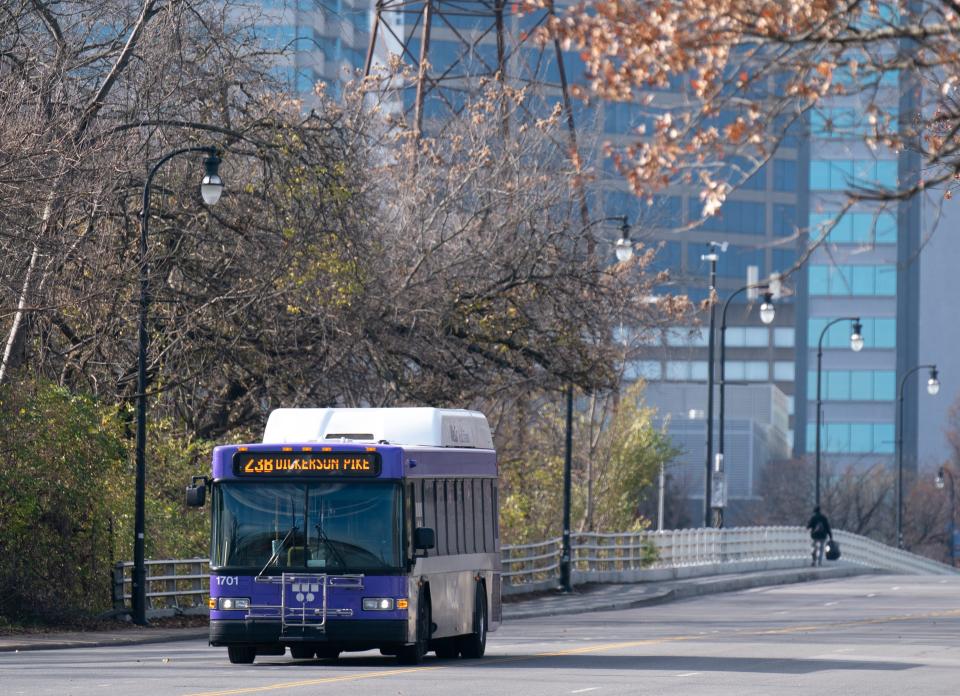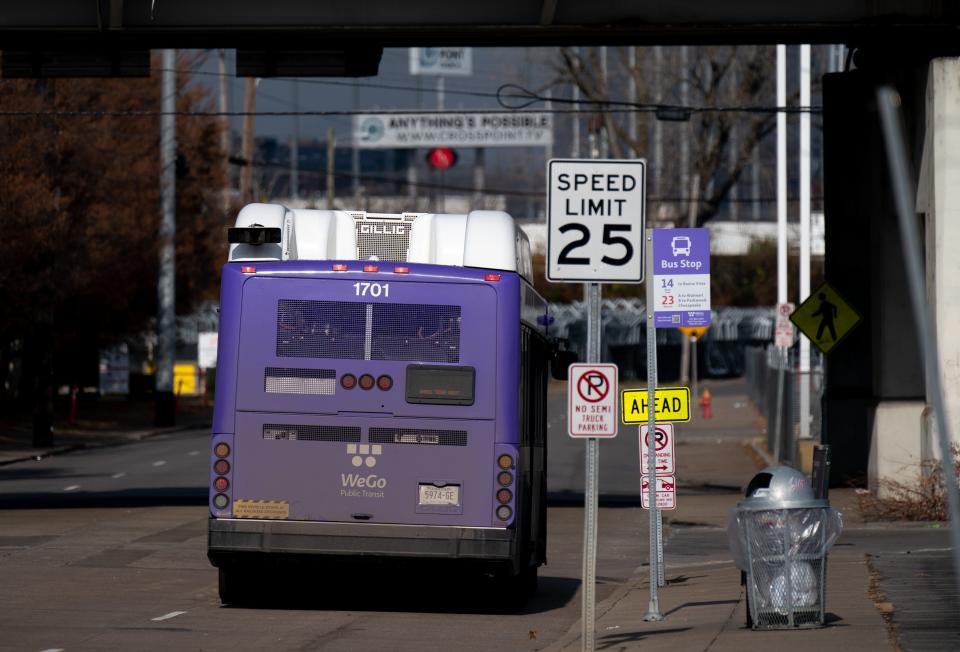Could Nashville vote on mass transit next year? What a successful path may look like
Nashville Mayor Freddie O'Connell campaigned on improving Music City's transportation, pledging to pursue a countywide vote on a tax raise to fund mass transit projects within his first term.
But when could voters see dedicated transit funding on the ballot? O'Connell's transition team is pushing for November 2024, coinciding with a presidential election likely to draw high voter turnout.
A timeline that tight could be a tall order, particularly as O'Connell continues to build out his administration.
Lessons learned from Nashville's failed 2018 transit referendum, which was heavily rooted in light rail and featured an underground tunnel that many viewed as too lofty, could help illuminate a path forward. O'Connell has already indicated his transit vision leans more toward building a more reliable bus system with more frequent service, and a high-capacity corridor to the airport.

But O'Connell's administration would also need to be careful not to repeat the 2018 effort's pitfalls: pushing a plan forward with too much haste and not enough public engagement or input.
Alex Jahangir, chair for the transition team's transportation-focused committee, told O'Connell he will have to involve transit-dependent riders and those who have never used public transit — and constantly communicate how transit benefits each of them — to secure a transit referendum triumph.
On Dec. 1, O'Connell said he is aiming to make a decision on whether to push forward toward a 2024 referendum by the end of this year. His team, he said, is analyzing whether it's feasible for Metro to produce a plan quickly enough to get it on the ballot.
Here's what it would take to make that happen.
What 2018's transit referendum failure taught Nashville
Of the nation's 50 largest metro areas, Nashville is one of just four that do not have dedicated funding for transit, according to research and policy advocacy group ThinkTennessee.
A transit referendum would allow Metro Nashville voters to approve or reject a proposed tax increase that would fuel a plan to improve transit infrastructure (roads, sidewalks and more).
The General Assembly passed the IMPROVE Act in 2017, granting Nashville and certain other cities and counties the ability to hold such a vote. The law requires cities to come up with a transit improvement program detailing projects and their estimated costs, which must be reviewed by an independent, state-approved auditor and receive approval from the state comptroller and Metro Council.
Nashville's 2018 attempt at a $5.4 billion plan anchored by light rail, an underground tunnel and bus improvements failed at the ballot box, 64% to 36%.

A post-mortem review of the failed "Let's Move Nashville" plan by New York-based foundation TransitCenter flagged the plan's hasty compilation, inconsistent public outreach strategy and failure to stress-test the plan with community members as contributors to its downfall. When then-Mayor Megan Barry, the public face of the referendum campaign, resigned amid scandal in January 2018, the referendum push was further shaken, the report states.
Barry told The Tennessean she thinks a 2024 referendum is "absolutely feasible, because we can't wait." O'Connell has a "long history of supporting transit" and has embraced the urgency of the city's transportation woes, she said. Barry supported O'Connell's mayoral campaign.
Ron Shultis, director of policy at The Beacon Center, a think tank that opposed the 2018 referendum, said the lesson he drew from Let's Move Nashville's downfall was not the timing of the vote.
"The lesson is it needs to be a better plan," he said. "I think the question is, is that feasible to truly come up with a better plan … (and) get stakeholder and public engagement and feedback all in that plan in time for a 2024 referendum?"
It's not impossible, Shultis said, but he's skeptical.
Erin Hafkenschiel, president of ThinkTennessee and former Office of Transportation and Sustainability director under mayors Barry and David Briley, said one of 2018's big challenges was completing the engineering necessary to form a plan and estimate costs while simultaneously trying to do public engagement. This time around, O'Connell's administration can use the work done in 2018 as a jumping-off point for conversations about the trade-offs of different transit solutions.
"Each time you come back to voters, when you're talking about a topic as complicated as transit and transportation infrastructure, the voters are more educated about the issue," she said.
It often takes more than one attempt for a city to secure dedicated funding, she added, pointing to Austin's success in 2020 after a failure in 2014.
And support for transit-related ballot items is holding steady — across the United States, 37 public transit measures landed on the ballot in 2022, and 80% of those saw transit wins, according to the Center for Transportation Excellence.
What could Nashville's next transit plan look like?
Recent advancements in Nashville's transit and O'Connell's policy platforms lend clues to what voters could see in a transit proposal. Three main themes arise:
A high-capacity corridor to the airport, whether bus or light rail
Bus Rapid Transit corridors with dedicated bus lanes/signals that give transit priority and a network of neighborhood transit centers
Funding for sidewalks
O'Connell said he doesn't intend to offer a "rail-heavy plan," believing that the 2018 plan "was probably over-invested in light rail." Instead, he would first build out a "high-quality, gold standard bus rapid transit" network, he said during his campaign, citing infrastructure feasibility and lower cost per mile.
Nashville is already seeing some movement toward its transit goals, including on items the Beacon Center proposed as alternatives to the 2018 plan.
The city will open a Traffic Management Center in early 2024. Paired with the installation of digital message signs and adaptive traffic signals, engineers could adjust signals to help alleviate congestion in real time.
Metro has funding to explore the inclusion of dedicated bus lanes on Murfreesboro Pike, one of WeGo's highest ridership routes. A North Nashville bus hub is expected to open in the spring, and bus rapid transit features heavily in the recently released ConnectDowntown draft action plan. WeGo has also rolled out a program offering ride-hailing vouchers to riders in certain less-dense areas of the county to get discounted fare to designated bus stops.
Shultis said he wants to see "proof of concept" from these initiatives to build public trust before pushing ahead with a referendum: Will North Nashville's new transit hub spark increased ridership? How much will adaptive traffic signals impact congestion?
Hafkenschiel said the WeGo bus ridership surge on Murfreesboro Pike is proof enough. Even without consistent sidewalks and density, use has surpassed 2019 ridership levels. The route runs near the airport and out to the growing Antioch area, where many people have been pushed in search of more affordable housing, she said. Nationwide research supports a successful transit formula: frequent service, dedicated lanes and near-24/7, 365 day operation.
"If we are putting service out there, and we're providing transit that hits these key principles, we'll see it be used," she said.
Public engagement and communicating cost
O'Connell said the idea of a transit referendum shouldn't come as a surprise to anyone who followed this year's mayoral campaigns.
"Almost every candidate of all partisan makeups and individual backgrounds spoke to the need for dedicated funding and the recognition that it is one of the key ways in which we lag peer cities," he said.
Barry agreed but offered a note of caution: 23% of eligible Nashville voters cast ballots in the September mayoral runoff election. "If only 23% of the people were paying attention, don't let that fool you into thinking that everybody's paying attention."
O'Connell's administration also has a chance to learn from a lack of meaningful engagement with advocacy groups and African American voices on equity, gentrification and displacement concerns, according to the TransitCenter's case study of the 2018 vote.
Hafkenschiel said Austin looked at Nashville's 2018 referendum attempt when shaping its 2020 campaign to be proactive about affordable housing and displacement. Austin included a $300 million anti-displacement fund in its plan to protect existing homes and build more affordable housing along transit corridors. It's not immediately clear whether the IMPROVE Act would allow this kind of spending initiative in Nashville.
The act allows counties to add transit-dedicated surcharges to any combination of the following local taxes, with the approval of voters: sales tax, business tax, motor vehicle tax and rental car tax, and hotel tax. The money must be spent on transit-related improvements.
The 2018 "Let's Move Nashville" plan would have increased Nashville's sales tax, hotel tax, business and excise tax, and car rental tax to amass $5.4 billion in funding.
Dianne Ferrell Neal, an attorney and critic of both Mayor Karl Dean's Amp bus rapid transit proposal and the 2018 referendum, said the key will be creating a "reasonable" plan and explaining how it benefits all Nashvillians, whether they use transit or not.
Neal said she thinks the idea of riding the bus or using other forms of public transit may be more appealing now than it was in 2012 or 2018 — Nashville has attracted newcomers, many of whom moved from areas of the country that have established public transit systems. But those people may have also been drawn by lower taxes and might consider moving to other Middle Tennessee counties should taxes rise.
Shultis largely agreed, noting that voters are willing to pay for large investments in public infrastructure so long as they believe they are good investments.
People understand there will be trade-offs, Neal said. She expects O'Connell to act as "chief explainer" if and when he moves forward with a proposal.
"There is going to be a certain cost to improve a transit program that gets tourists to the airport, but how much of that should I bear?" Neal asked. "There's going to be a certain cost to making sure that workers can get downtown without us having to build more parking. Where does that fit into how it affects me? Is it a good thing for my children? Is it good for my grandchildren?"
This article originally appeared on Nashville Tennessean: Nashville transit referendum: High voter turnout could help pass goal
